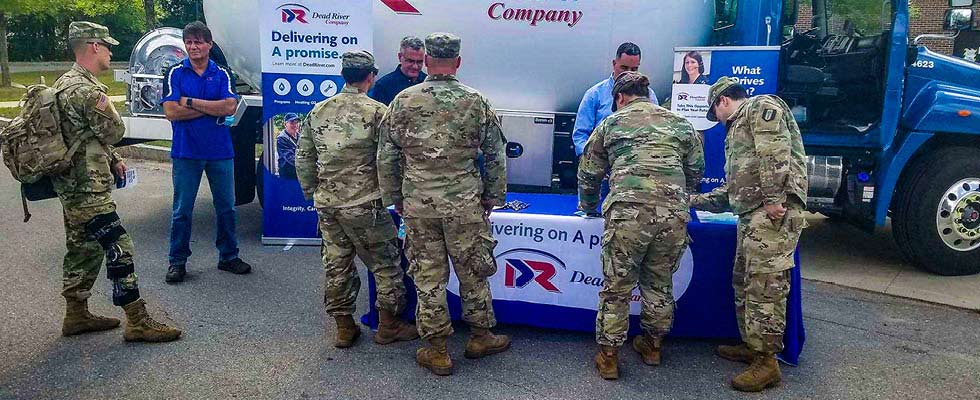
As we move our industry into the future, we implement new technologies, better business intelligence and more effective data analytics to provide better service to our customers and operate our businesses more efficiently. The critical factor for each of these advancements is people.
Given the tightening labor market and increased competition for employees, the question becomes how we replace those who choose to retire or leave the workforce. How do we find new sources of talent to help our companies grow?
A common refrain I hear is that veterans provide a wonderful source of talent. But knowing that pool exists is only the beginning:
- Why should you hire a veteran?
- How do you find them?
- How do you engage them?
- How do you retain them?
As a veteran who has experienced the transition to a civilian career in the propane industry, I want to share my personal thoughts and observations on why hiring veterans is so important to the future of our workforce.
There are many reasons to hire a veteran; first among these is that they understand the idea of a “mission.” They are adept at taking higher-level guidance and translating it into action. From top to bottom, each military service member is trained and educated to think and act as part of a team, but, when required, to act independently and make the best decisions they can with the information available. Service members take initiative, and they are motivated.
Since the military emphasizes both personal and professional self-improvement, many have at least some college education if not a degree — and possibly multiple degrees. Additionally, those veterans are probably used to relocating, so recruiting and hiring from outside your geographic area are not necessarily obstacles. As an example, over the course of more than 20 years in uniform, I moved 12 times, including several times cross-country. Relocating is just “part of the job” for most veterans. So, how do you find and hire veterans? I have some thoughts.
Finding veterans — like finding talent in general — takes engagement. I mean focused, determined, energetic engagement. Many states have independent organizations (some nonprofit, some for-profit and some informal) which focus on making grassroots connections with relocating veterans. These organizations are loosely based on military sponsorship programs, connecting relocating military members with sponsors at their new duty station who help them through the process.
For example, here in New Hampshire, the New Hampshire Military Coaching Alliance is a group that connects local businesses and business leaders (almost all of whom are veterans) with those service members who are coming back to New Hampshire or are already here, providing coaching and mentoring as well as connections. Similarly, in Maine, Boots2Roots is a 501(c)(3) that provides networking, coaching and résumé review, among other services. Groups like these were founded on the principle that assisting veterans with their transition to civilian life is an important and ongoing mission.
Your state may also have a government organization chartered to provide services to veterans, and some even have programs to recognize businesses as “veteran friendly.” New Hampshire’s Department of Military Affairs and Veteran Services does just that, and three years ago, they created New Hampshire’s Veteran Friendly Business Recognition Program.
Since its inception, the program has grown rapidly. Aside from sharing lessons to benefit veterans in general, these programs also allow businesses to connect and share best practices in recruiting and retaining veterans. Sometimes this even means passing a veteran with a specific skill set to another business in the network where their talent is a better fit. The lesson: Don’t be parochial; when we hire veterans, we all win.
There are also national organizations which focus on specific industries. Vets2Techs focuses on finding military talent with the propensity for development in the propane industry — and who among us doesn’t need a technician or two? They are staffed by veterans who know the industry inside and out, and they know how to relate to veterans, too.
Vets2Techs Executive Director Jesse Lord tells me that in the propane industry, we “have amazing career opportunities to provide service members … but there’s still so much more we can do.” Thinking of his own experiences, he noted that, “Even as a Green Beret, I can still remember the trepidation I experienced when deciding to join my family’s industry. Looking back, I realize that the same values that drew me to serve my country are upheld here.”
And so, Lord and team continue their mission to focus on the education of our workforce and the promotion of opportunities in our industry. He, too, believes that the “culture and values throughout the veteran community will guarantee [our] future is secure.”
Career fairs are also excellent ways to connect with military talent. Maine’s Hire-A-Vet campaign is a statewide effort focused on connecting veteran talent with Maine businesses, as one example. National Guard units often host recruiting events, as do military reserve units. If you have the opportunity to attend one of these events, it is imperative to personally connect with the veterans.
Too many times during my transition, I heard, “Hey, great to meet you. Thanks for the résumé. Just go online to our website and find a job you like, and then apply that way.” I always thought it was strange that I was attending an in-person job fair to connect with people to talk about jobs, but those people just referred me to a website.
So, here is the best practice: If you can, connect interested veterans with someone in your company who can talk with them. Possibly it is a recruiter, or possibly it is a member of a veteran resource group. It could also be a manager. Regardless, a 10- to 15-minute discussion shows that veteran that you value their time! Remember, this may be that veteran’s first time applying for a civilian job. Many seek purpose and belonging, and establishing a personal connection will give you an advantage.
I fully realize that I just advised you not to send veterans immediately to your website; however, there is a caveat: If you have a web presence, take some time to create a veteran landing page that shows a little about what life is like as a veteran at your company. (Check out deadriver.com/veterans). Put a quick form on the site just asking for their name, phone and email, and promise them a call back. This is a riff on what I mentioned above: Have the person who replies be “fluent in veteran” and have a 10- to 15-minute conversation. You will be surprised at the goodwill that earns you.
The theme I hope I conveyed so far is, there is no substitute for person-to-person contact, and that is a worthy goal — although hard in this post-COVID-19 world of ours. Here are a few more ideas to make that connection: Try creating veteran-specific job listings and include a direct point of contact; put your name, phone number and email in the listing if you are comfortable doing so. If the point of contact is a veteran, even better.
Build that relationship with the veteran. Don’t be shy about introducing them to your professional network. The connection you make for that veteran may make the difference in their decision to move to your town, city or state, and it builds trust. At the risk of sounding like a broken record, my advice is the following: Don’t be parochial; when we hire veterans, we all win.
This is also a great time to talk about military spouses. In some cases, you may not have a position for the veteran, but their spouse may be a perfect fit. Spouses often have a broad and diverse skill set which is different from, but just as valuable as, the veteran. So, when you can, ask about their spouse, too!
Once you have hired a veteran, continue that engagement and focus on retention. One best practice for attracting and retaining veterans is to offer Veteran’s Day as a paid holiday. Also, if possible, offer to make up any shortfall in pay for Reservists/National Guardsmen who are called to active duty (entering active duty almost always means taking a pay cut).
Other intangibles include ideas such as creating a veteran support group; gathering them once or twice a year (maybe have an interesting guest speaker); and perhaps even engaging them in your hiring process.
For example, ask them to help “translate” the military terms you might encounter in résumés into a language hiring managers understand. Much like our industry, the military has its own language. For example, on my LinkedIn profile, I list “military jargon” as a second language.
Continuing to operate our businesses with the best technology and equipment possible is essential, but we need people to make it all happen. The military veteran population is a dynamic source of talent, and we must do our part to make our industry as attractive as possible. By understanding a little about the veteran journey, forging personal connections and building trust, the word will spread quickly that propane is the industry to be in.
As one final note, I ran this article by all the aforementioned veterans and veteran groups to seek their advice. Each one shared their time and wisdom to help me produce this because we all understand and want you to know: When we hire veterans, we all win.
Tips for Engaging Veterans at Hiring Events
Veteran hiring events are great venues for meeting and engaging with veteran talent. Here are a few pointers to keep in mind to help you connect and engage at events you attend. This applies both in-person and virtually.
DO:
- Bring a veteran employee with you if possible.
- Bring plenty of business cards and invite veterans to reach out to you directly with questions. Answer them when they do!
- Tell them why veterans love working for your company and how it serves veterans.
- Ask if they have a spouse who might be interested in your company.
- Ask for their information — just a name and phone number or email. Reach out to them after the event and ask if they have any questions. Be transparent!
- Review their résumés closely. If you are confused by the military jargon, ask a veteran employee to help you understand it.
- If you think a veteran is a good fit for a position, talk to the hiring manager about them and share their résumé.
DO NOT:
- Let them walk by your table without purposeful engagement.
- Refer them to your website for more information. You should take the opportunity to give them the info.
- Be parochial; when we hire veterans, we all win!


